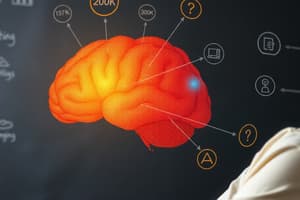Podcast
Questions and Answers
What does metacognition primarily refer to?
What does metacognition primarily refer to?
- Thinking about others
- Creative problem solving
- Memory retention techniques
- Thinking about thinking (correct)
Metacognition is not an essential skill in learning.
Metacognition is not an essential skill in learning.
False (B)
Who is the author associated with the concept of metacognition in this content?
Who is the author associated with the concept of metacognition in this content?
Lauro J. Espiritu Jr.
The term ______ refers to the awareness and understanding of one's own thought processes.
The term ______ refers to the awareness and understanding of one's own thought processes.
Match the following terms related to metacognition with their descriptions:
Match the following terms related to metacognition with their descriptions:
What is the primary concept of metacognition?
What is the primary concept of metacognition?
Metacognition is an essential skill in learning.
Metacognition is an essential skill in learning.
Define metacognition in your own words.
Define metacognition in your own words.
Metacognition is often described as ______ about one’s own thinking.
Metacognition is often described as ______ about one’s own thinking.
Match the following terms related to metacognition with their definitions:
Match the following terms related to metacognition with their definitions:
Flashcards are hidden until you start studying
Study Notes
Metacognition Overview
- Metacognition refers to the awareness and understanding of one's own thought processes.
- It involves self-regulation, monitoring, and evaluating cognitive strategies to enhance learning and comprehension.
- Important for learners to develop skills in planning, monitoring, and evaluating one's learning strategies.
Significance of Metacognition
- Encourages deeper understanding of subject matter by enabling students to assess how they learn best.
- Helps in identifying gaps in knowledge and adapting approaches accordingly.
- Acts as a critical skill for lifelong learning and adaptability in various contexts.
Components of Metacognition
- Metacognitive Knowledge: Awareness of one's cognitive abilities, task demands, and strategies.
- Metacognitive Regulation: The ability to manage one's learning through planning, monitoring, and evaluating.
Strategies to Enhance Metacognition
- Self-Reflection: Regularly assess what works and what doesn't in personal learning strategies.
- Use of Journals: Document learning experiences to identify effective methods and areas needing improvement.
- Setting Goals: Establish clear, achievable objectives to guide learning processes.
- Questioning: Pose questions to yourself about understanding and approach towards tasks.
Implications for Educators
- Integrating metacognitive strategies into teaching can significantly improve student outcomes.
- Provide students with tools for self-assessment and reflection to foster independent learning.
- Encourage an environment where discussing cognitive strategies is valued and practiced.
Metacognition Overview
- Metacognition refers to the awareness and understanding of one's own thought processes.
- It encompasses self-regulation and self-reflection regarding cognitive activities.
Importance of Metacognition
- Enhances learning by enabling individuals to monitor and control their learning strategies.
- Empowers learners to assess their understanding and adjust their approach to studying.
Key Components of Metacognition
- Metacognitive Knowledge: Awareness of one's cognitive abilities and beliefs about learning.
- Metacognitive Regulation: Strategies used to manage and improve learning processes, such as planning, monitoring, and evaluating tasks.
Benefits of Metacognitive Strategies
- Promotes effective learning outcomes through adaptive learning techniques.
- Increases retention and comprehension of information.
- Encourages independent learning and critical thinking skills.
Application in Education
- Educators can foster metacognitive skills by integrating reflective practices into lessons.
- Use of self-assessment tools to help students evaluate their understanding and strategies.
Conclusion
- Metacognition plays a vital role in effective learning and personal growth.
- Students equipped with metacognitive skills are better prepared to tackle complex problems and lifelong learning challenges.
Studying That Suits You
Use AI to generate personalized quizzes and flashcards to suit your learning preferences.




